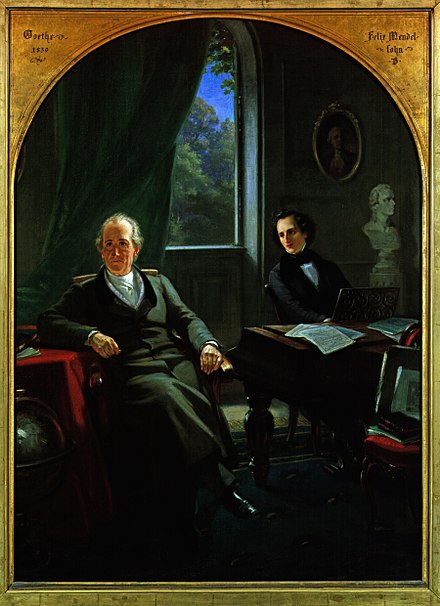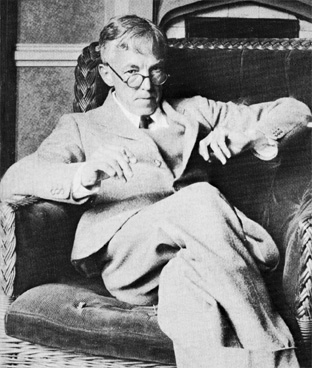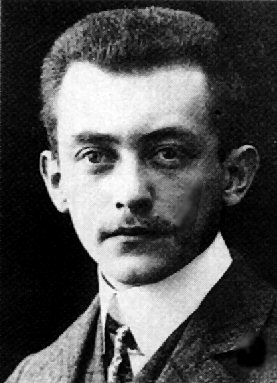事实上我们全都是些集体性人物,不管我们愿意把自己摆在什么位置,严格地说,可以看成我们所特有的东西是微乎其微的,就像我们个人是微乎其微的一样。我们全都要从前辈或同辈那里学习东西,就连最大的天才,如果单凭他所特有的内在的自我去对付一切,他也绝不会有多大成就。我们的发展要归功于广大世界千丝万缕的影响,从这些影响中,我们吸收我们能吸收的和对我们有用的那一部分。(歌德)

But, in fact, we are all collective beings, let us place ourselves as we may. For how little have we, and are we, that we can strictly call our own property? We must all receive and learn both from those who were before us, and from those who are with us. Even the greatest genius would not go far if he tried to own everything to his own internal self.
I by no means owe my works to my own wisdom alone, but to a thousand things and persons around me, who provided me with material. There were fools and sages, minds enlightened and narrow, childhood, youth, and mature age - all told me what they felt, what they thought, how they lived and worked, and what experiences they had gained; and I had nothing further to do than to put out my hand and reap what others had sown for me.
— Johann Wolfgang von Goethe, Goethe’s Works
任何个人要想突然做出惊人的发现,这是不符合事物发展的规律的。科学是一步一个脚印地向前发展,每个人都要依赖前人的工作。当你听说一个突然的,意想不到的发现 —— 仿佛晴天霹雳时,你永远可以确信,它总是由一个人对另一个人的影响所导致的,正是因为有这种相互影响才使科学的进展存在着巨大的可能性。科学并不依赖于某一个人的思想,而是依赖于千万人的集体智慧,千万人思考着同一个问题,每一个人尽他自己的一份力量,知识的大厦就是这样建造起来的。(卢瑟福)

It is not in the nature of things for any one man to make a sudden violent discovery; science goes step by step, and every man depends on the work of his predecessors. When you hear of a sudden unexpected discovery—a bolt from the blue, as it were—you can always be sure that it has grown up by the influence of one man on another, and it is this mutual influence which makes the enormous possibility of scientific advance. Scientists are not dependent on the ideas of a single man, but on the combined wisdom of thousands of men, all thinking of the same problem, and each doing his little bit to add to the great structure of knowledge which is gradually being erected.
— Ernest Rutherford
我曾经为知识领域添瓦加砖,也曾帮别人添枝加叶;这些东西的价值,比起身后留下某种纪念物的大数学家或任何其他大大小小的艺术家们创造的价值,只是程度上有所不同,性质上并无差异。(哈代)

The case for my life, then, or for that of any one else who has been a mathematician in the same sense which I have been one, is this: that I have added something to knowledge, and helped others to add more; and that these somethings have a value which differs in degree only, and not in kind, from that of the creations of the great mathematicians, or of any of the other artists, great or small, who have left some kind of memorial behind them.
– A Mathematician’s Apology, G. H. Hardy
我认为,科学领域不存在可以遵循认识论路标抵达真理的哲学捷径。不,我们科学家仿佛在黑暗的丛林里摸索行进,只能通过不断尝试与犯错来发现蜿蜒曲折的正确道路,在探索未知的迷茫途中独辟蹊径。迷宫一样的岔路口没有现成的路标,而是我们的先行者自己探索方向并树立路标,为后人指引方向。(马克斯・玻恩)

I believe there is no philosophical high-road in science, with epistemological signposts. No, we are in a jungle and find our way by trial and error, building our road behind us as we proceed. We do not find signposts at crossroads, but our own scouts erect them, to help the rest.
– Experiment and Theory in Physics, Max Born
每个人都是混账、坏蛋,只有耶稣基督除外。爱因斯坦也是个坏蛋,因为在原子弹被引爆之后,他并没有离开美国,尽管他曾极力反对使用原子弹。
最终,通过事物之间的普遍联系,一个人会以这样或那样的方式,在深浅不等的程度上与世界上发生的所有事物都扯上干系。如果一个人可以对任何一个事件施加任何影响,那么他就要为此承担责任。(亚历山德罗夫)

Everyone is a bastard, everyone is bad, with the possible exception of Jesus Christ. Einstein is bad too, because he did not leave America after the nuclear bomb was detonated over his objections.In the end, through the general interconnectedness of events, a person becomes, in some way or another, to a greater or lesser extent, party to everything that happens in the world, and if he can exert any influence whatsoever on any event, then he becomes responsible for it.
– Aleksandr Danilovich Aleksandrov